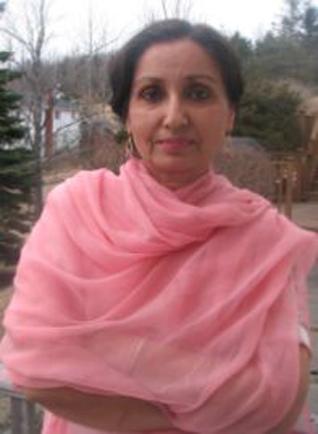People
Taking The Bull By The Horns
An Interview of KANWAL KAUR SIDHU
The Maritime Sikh Society ("MSS") was founded in 1968 to serve the needs of the sangat in Halifax (Nova Scotia, Canada).
In 1992, it made history by becoming the first gurdwara in North America - and possibly the world - to have an all-women executive committee to manage its affairs.
In December 2009, the members of the society once again selected an all-women executive team to manage the gurdwara, including president Kanwal Kaur Sidhu.
"I am honoured and privileged to be given this opportunity to serve the Sikh community. I am humbled by the trust and faith placed upon us," says Kanwal Kaur.
She has a deep connection with this gurdwara going back to her father, Gurcharan Singh, who in April 1968 had invited Sikhs from all over the region to celebrate Vaisakhi at his home. It was there that the notion of a formal Sikh organization was tabled, a committee formed and the Maritime Sikh Society conceived.
Kanwal's mother, Surjit Kaur, also served as president in 1993-94. In fact, since its inception, women have played key roles and have participated fully in all affairs and activities of the society.
When India's high commissioner, S. Gurdial Singh Dhillon, once saw a woman leading the ardas ceremony in the gurdwara, he said, "This is the first time I have seen a woman performing an ardaas in a gurdwara. You have given them the equal rights they deserve."
We spoke with Kanwal Kaur about the role of women at MSS and the status of women in society today.
What kind of feedback have
you received to having an all-women executive?
Kanwal Kaur ["KK"]: So far we have received only positive comments and a lot of support! It has been very encouraging. India's Sikh cabinet minister, Sardar M.S. Gill, commented in The Tribune that the "SGPC (Shiromani Gurdwara Prabandhak Committee) should emulate Halifax's example". Hopefully, this story will encourage more women to take leadership roles in gurdwaras and men will be more accepting of the idea.
What are some key roles women play in the gurdwara?We actually don't have a professional granthi here in the Halifax gurdwara. All the seva is done by volunteers in the sangat. In addition to preparing langar, women perform many of the other duties at the gurdwara. For example, it is mostly women that recite ardas, do kirtan and recite the lavans at weddings. They are free to take vaaks, administer oaths to the incoming executive or address the congregation. Currently, Sardarni Satpal Kaur Sodhi is doing a series of lectures on the lesser known Gurus of Sikhism. She is highly knowledgeable in Sikh traditions, culture and religion. She has published several books on various aspects of spiritual life and Sikhism.
Our gurdwara would definitely not be able to run without our female members of the sangat!
The male members of the Maritime Sikh Society fully support the aforementioned roles that women take on in our gurdwara. We are very fortunate that our gurdwara enjoys a harmonious relationship between the men and women, and the men play just as important a role in the smooth operation of the gurdwara. They always support and encourage the women to come forward and serve in any capacity, including serving on the executive.
What inspired you to get involved and run for President?I have been a part of our Sikh community here since I was a young child. The Maritime Sikh Society was founded in 1968 in my parents' house. There were only about 27 Sikh families at that time here in the province of Nova Scotia.
For the first 10 years, the Maritime Sikh Society held gatherings in rental halls or school gyms. My father, S. Gurcharan Singh, served in various capacities for the first eight years of this Society. As a young child, I was involved in all the activities, whether it was helping carry heavy carpets for the floor or washing dishes after a service. My father was a very spiritual man who had a deep love for gurbani. He embodied all that our Gurus taught us. He was a very humble, kind, compassionate man who showered all those he knew with lots of love. His friends belonged to all faiths as he did not see any divisions between people. He only saw humanity. You could say my father was most influential in me developing a deep love for my culture and my Sikh faith. Gurbani kirtan played in our house continuously. My mother, Surjit Kaur, is also a very learned and devout woman. She was the force behind my father, silently doing seva for years on end and never looking for recognition. She has also served as the president of MSS. I took on this seva to honour my parents and to carry on my father's legacy.
What are some of your goals with MSS?My main goal is to serve this community to the best of my ability while keeping in mind the tenets of Sikhism. I hope to be a positive role model to the young women here while teaching them that in Sikhism, we are all equal. Not just in terms of gender, but in terms of race, caste, class, etc.
Why do you think more women are not involved in these types of roles at other gurdwaras?
This is likely because Sikh women are still suffering under traditional prejudices, bias and challenges. While the Rehat Maryada clearly states the equality of men and women, including while doing seva in the gurdwara, many times we don't see women participating because of cultural ideas that don't see women as equal. These are the same cultural chains the Gurus worked so hard to get rid of.Gender equality is enshrined in the Sikh religion but has that translated to equality in the Punjabi community?
It is very unfortunate that many of the progressive teachings of the Sikh Gurus, which were 500 years ahead of their time, have been forgotten.
However, Sikhism did originate and develop in India, which is a male-dominated society.
In most developing societies where educational resources are limited, girls are treated differently and more poorly than boys. Social pressures, chauvinistic attitudes, and essentially forgetting what the Sikh Gurus taught us, have resulted in the position of Sikh women being hampered.
Fortunately, though, the situation is improving. In a recent study, Jutt (Rural) Sikh Women: Social Transformation Changing Status and Lifestyle, 2010, the author Amarinder Sandhu finds that education among the girls in Punjab is on the rise. With education, economic empowerment and an analytical look back at the teachings and lives of the Gurus, the study of Sikh Scriptures has reawakened Sikh women as well as Sikh men. They are now conscious of rights of women as equal partners in human progress, and citing the Holy Scriptures, they are fighting back for these rights. Sikhism promised an equal place to women but unfortunately the practice fell far short of the preaching.
What are some areas where you'd like to see more action on gender equality in our society?I would definitely like to see action taken in the area of domestic violence against women. I believe education is the key to empowering young women who are often the victims of domestic abuse. A lot of these women are unaware that there is a way out and continue to suffer silently.
Female infanticide is also undoubtedly a serious problem that needs to be rectified. Although Indian culture has improved with regards to respecting women, we still do not place women on an equal level with men, leading to many female abortions. It isn't only the men that devalue women, but the women as well. I do think, though, that the situation is getting better and the issue is being picked up and addressed by the Punjab government, Sikh clergy and the media.
What about the role of women in Sikh religious institutions?In the time of Guru Amar Das, three of the appointed masands (regional preachers) were women.
These women were put in charge of spreading the message of Sikhism, handling sangat issues and the administration in their communities. Throughout history, Sikh women have always stood side-by-side joining in all panthic seva. We have had a history of Sikh women being head of Sikh congregations, and leaders in Sikh battles and misls (confederations) .
It is a tragedy that today, there is even an issue of Sikh women not being able to partake in early morning seva and kirtan seva at Darbar Sahib or other gurdwaras. Can you imagine not allowing Mata Gujri to do seva? In our ardaas, we daily speak of the Sikh men and women who have given their ultimate sacrifice for the seva of the panth. Guru Gobind Singh solidified the concept of equality with the introduction of the ONE Khalsa of Kaurs and Singhs.
It is very sad that whereas in the times of our Sikh Gurus we saw Sikh women in leadership roles in the clergy, today there seems to be no remnants of women occupying such positions.
What do you do in your gurdwara to help educate people on the equality of women?Well, I think our community here in Halifax is quite fortunate in that the members are all quite highly educated. This extends to the community's views on gender equality and the valuable position women occupy in society. Women in our community are highly valued members of the congregation and greatly contribute to the running of the gurdwara.
What do you think Sikh parents can do to help interest their children in the religion?It is very important for parents to take their children to gurdwara on a regular basis. The children should be encouraged to become important participants in all forms of seva at our religious institutions. This develops an important connection to our religion and also cultivates friendships with other Sikh children, especially in smaller communities such as ours.
Sikh parents should teach their children how the tenets of Sikhism (such as seva, equality and love for all) correlate to their day-to-day lives. The best teacher always leads by example. Children learn best when behaviours are modelled for them. They should be made aware of what a beautiful faith we have and how it is one of the most progressive religions in the world.
What advice do you have for young Sikh women in general?First and foremost I would encourage all young Sikh women to strive toward getting a good education. Education is power and it opens minds. They should follow their passion, whatever that happens to be. They need to stay connected to their roots and their faith. We all need an anchor in our lives and it is our faith that sustains us in time of adversity. Our heritage is one that is so rich and diverse. We have a goldmine that the western culture is only now discovering.
I would also encourage all young women to get involved in their community and give of themselves in some way - volunteer at the local gurdwara, help the homeless, any charitable activity.
[Courtesy: Mehfil Magazine]
April 30, 2010
Conversation about this article
1: Deepa Gill Takrani (Toronto, Ontario, Canada), April 30, 2010, 12:00 PM.
I was very encouraged to read Kanwal Kaur's views on Sikhism and how we can help more women to come forward and be leaders in the community. I wish more gurdwaras in North America will follow Halifax's example and elect women executives. Maybe then there will be more harmony and peace in our lives.
2: Sangat Singh (Kuala Lumpur, Malaysia), April 30, 2010, 2:45 PM.
Guru Granth Sahib has decreed unequivocally that the woman is equal to man, and has the same make up to grow spiritually in all respects. They can perform all religious activities and do so without any hindrance. We in Kuala Lumpur have such a shining example in Bibi Ranjit Kaur as a most respected granthan sahiba in the Titiwangsa Gurdwara. It is the woman who keeps the human race going, as clearly enunciated in no uncertain terms in Asa-di-Vaar. Unfortunately, this gender equality has been forgotten even in the Harmandar Sahib due to some dubious tradition obviously made by men. Despite this apparent anomaly, Sikhs still do stand head and shoulders among other faces and races. Even the Muslim chroniclers have acknowledged that "Sikhs looked upon all women as mothers, daughters and sisters." Bhai Gurdas has the clearest injunction to treat women as mothers, sisters or daughters. Such is the respect for women among Sikhs. Hope we continue to live up to these ideals. Bebe Nanaki, the only (elder) sister of Guru Nanak, was the first Sikh, recognized him as a Pir rather than just a veer. Such is our checkered history as the first religion to advocate most emphatically the equality of the genders. The first gurdwara in North America to live up to this ideal has provided such a lead to have an all women executive committee and set an example for the generally smug male bickering committees. Well done! May you go from strength to strength in Chardi Kalaa!
3: Yashwant Rai (Halifax, Nova Scotia, Canada), April 30, 2010, 4:30 PM.
My Humble regards to all brothers and sisters associated with the Sikh Gurdwara in Halifax. Right from day one of its inception, it has been blessed with selfless, dedicated and honest devotees to serve the community. A visit to the weekly sangat on any Sunday is an experience in Divine Love and Devotion. Congratulations to the current executive and all members for a superb job.
4: M. Singh (Toronto, Ontario, Canada), April 30, 2010, 5:36 PM.
Thank you, Kanwal ji, for your leadership.
5: Srichand Takrani (Toronto, Ontario, Canada), April 30, 2010, 6:30 PM.
I was very heartened to see women leading the Gurdwara through its executive committee. The Halifax sangat has set a great example for the Sikhs to follow in other gurdwaras around the world. Our culture needs more women leaders to help other women to gain equality and self-confidence. Hopefully other gurdwaras will follow suit and women will be respected as equals, as they were in our Gurus' times.
6: Raj (India), April 30, 2010, 6:36 PM.
It is a good initiative.
7: Irvinderpal Singh Babra (Brampton, Ontario, Canada), April 30, 2010, 7:32 PM.
So many wives, daughters and mothers of the troublemakers and of gurdwara commiitee members have told me that they are sick and tired of what their men-folk are doing in the gurdwaras, groups and websites. So, Kanwal ji, thanks for your leadership. Chardi kalaa.
8: Harkirat Kang (Kolkata, India), May 01, 2010, 9:43 PM.
It is very heartening to read that women volunteers are very active along with their leader, Kanwal, in managing the activities of the Halifax gurdwara. Congratulations to all of you. I wish you all the success and hope your welfare activities also guide other Sikhs around the world to develop themselves culturally, socially, educationally with this religious motivation and not follow the charlatan babas and deras.
9: Gurinder Singh Johal (Amritsar, Punjab), May 02, 2010, 10:39 PM.
Very interesting. I think it should be published in all the newspapers here in Punjab as well. Although Sikhism originated in Punjab, we still have some people who are into medieval practices. For example, women are not allowed to perform some of the duties in some gurdwaras. We seem to have regressed to the point that we are taking away freedom from our women. There are a lot of unnecessary taboos being imposed. It will be very good if the likes of your women's committee visit Punjab and tell the people what is happening in the diaspora.
10: Jasbir Singh Sethi (Houston, Texas, U.S.A.), May 05, 2010, 11:53 AM.
Excellent example. I am sending a booklet "Sikhism on Women" to the respected Editor for offering to readers for a free download.
11: Rajinder Singh Sekhon (U.S.A.), May 15, 2010, 1:44 PM.
Kanwal Kaur Sidhu has shown a lot of courage in discussing women's issues so openly on the world stage. Even in the western world, women are still being discriminated. The prime reason for Hillary Clinton to loose the presidential race so early was this discrimination. Even in our own religion, women are not allowed to become granthis, etc. - contrary to the teachings of the Gurus - which wrong should be corrected immediately. Kanwal's family has been in the forefront in establishing the Halifax gurdwara and in running it smoothly. I encourage Kanwal and family to continue the good work started by Gurcharan Singh ji and carried on by Kanwal and her mother, Surjit Kaur.
12: Jagdeep Singh Mohi (Halifax, Nova Scotia, Canada.), July 18, 2010, 9:19 AM.
I am a student at Dalhousie University in Halifax. I am really impressed that our people have maintained our culture in this small city so well and what surprised me is that it is led by women members. Well done ... Keep it up!
13: Jorahvar Singh (Woolgoolga. NSW, Australia), May 18, 2011, 7:08 AM.
Dear Sanjay ji, well done. May many more congregations follow in your foot steps. God bless you.





